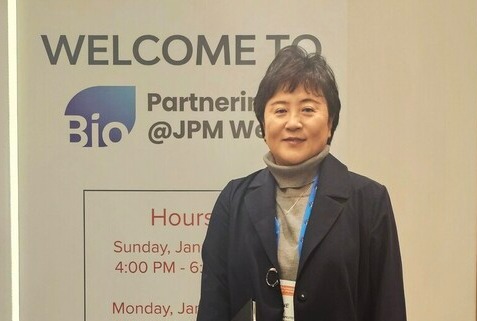SAN FRANCISCO, Calif. -- By Kim Chan-hyuk/Korea Biomedical Review correspondent -- Artificial intelligence (AI) drug discovery company Pharos iBio is expanding its collaboration with global pharmaceutical companies as it demonstrates the performance of its drug discovery platform.
The company is actively discussing technology transfer and joint development based on the excellent clinical results of its leukemia drug candidate.
“We are receiving inquiries from global pharmaceutical companies about the efficacy and safety profile confirmed after the completion of the phase 1 clinical trial of PHI-101,” Pharos iBio USA co-CEO Han Hye-jung said Monday (local time) at a hotel where the 43rd J.P. Morgan Healthcare Conference and Biotech Showcase is held. “Meaningful results will be achieved within this year.”

In a phase 1 study completed last year, PHI-101 demonstrated significant therapeutic benefit in patients with acute myeloid leukemia (AML) who were refractory or relapsed after becoming resistant to existing therapies. The trial, which was conducted at hospitals in Korea and abroad, including Seoul National University Hospital, Asan Medical Center, and Samsung Medical Center, saw 50 percent of evaluable patients achieve a complete response.
Phase 1a confirmed excellent tolerability with no dose-limiting toxicity up to 200 mg, and phase 1b was conducted as a 160 mg monotherapy, higher than the existing approved treatment.
These results were also presented at the American Society of Hematology (ASH) in San Diego in December.
The leading FLT3 inhibitors for AML are Astellas' Xospata (gilteritinib) and Daiichi Sankyo's quizartinib (Vanflyta in international trademark). Gilteritinib was approved by the U.S. Food and Drug Administration (FDA) in 2018, but drug resistance has been reported in some patients. Quizartinib was approved in 2023 and is used as a first-line treatment.
Han explained that while existing therapies are already well established in the market, PHI-101 is showing efficacy in a broader patient population.
“The longer clinical trials due to Covid-19 have been an opportunity,” Han said. “We have demonstrated the effectiveness of PHI-101 in patients where competing drugs are not working.”
Han emphasized the opportunity in Europe. “Currently, only gilteritinib is available in Europe, but there is a high demand for a new treatment due to the high relapse rate,” she said. “European physicians believe that PHI-101 could become the next standard of care.”
Pharos iBio is also accelerating its pipeline expansion this year. In the first half of the year, the company plans to file a phase 1 IND for PHI-501, a pan-RAF and DDR1 dual inhibitor, and a phase 2 IND for PHI-101 in the year's second half. Early next year, the company plans to begin enrolling the first patients in the phase 2 trial of PHI-101.
Along with its headquarters in Korea, Pharos iBio has subsidiaries in Australia and the U.S. “Each entity is leading partnerships and joint development with overseas companies to promote global open innovation,” Han said. “We are prioritizing cooperation with companies in countries where existing competing drugs have not entered.”
Pharos iBio is also expanding cooperation through its AI drug discovery platform Chemiverse. “Various forms of collaboration are possible, including designing new drugs and expanding the indications of existing drugs,” Han said. “We are already receiving joint development proposals from various companies.”
Han cited data quality and laboratory validation as key competencies in AI drug discovery. “The results presented by AI are only hints,” she said. “It is important to ensure reliability through laboratory verification and train the data back to the AI to improve the accuracy of the prediction.”
According to Han, Pharos iBio ultimately aims to shorten the development time of innovative new drugs through its AI platform.
“Pharos iBio CEO Yoon Jeong-hyeok and CTO Nam Ky-youb have been preparing for the need for AI-based drug development for 20 to 30 years,” she said. “Our goal is to develop innovative new drugs that will benefit patients quickly.”

